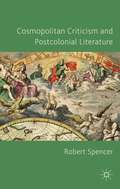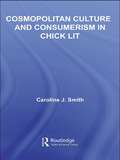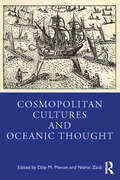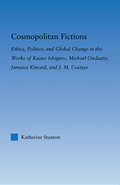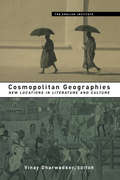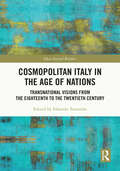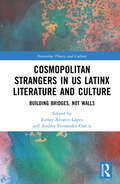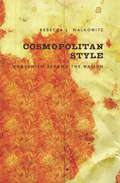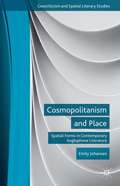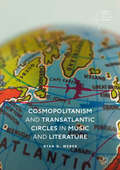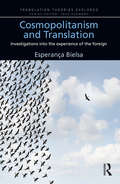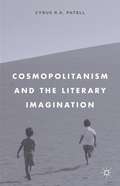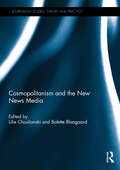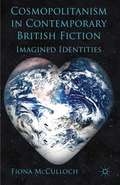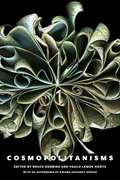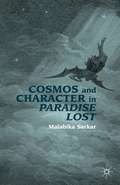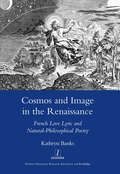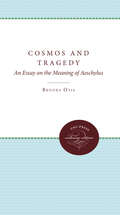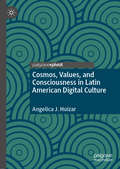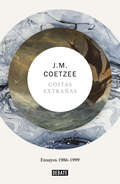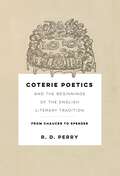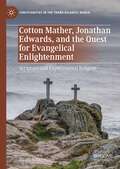- Table View
- List View
Cosmopolitan Criticism and Postcolonial Literature
by Robert SpencerVia readings of novels by J. M. Coetzee, Timothy Mo and Salman Rushdie and the later poetry of W. B. Yeats, this book reveals how postcolonial writing can encourage the enlarged sense of moral and political responsibility needed to supplant ongoing forms of imperial violence with cosmopolitan institutions, relationships and ways of thinking.
Cosmopolitan Culture and Consumerism in Chick Lit (Literary Criticism and Cultural Theory)
by Caroline J. SmithCosmopolitan Culture and Consumerism in Chick Lit focuses on the literary phenomenon popularly known as chick lit, and the way in which this genre interfaces with magazines, self-help books, romantic comedies, and domestic-advice publications. This recent trend in women’s popular fiction, which began in 1996 with the publication of British author Helen Fielding’s novel Bridget Jones’s Diary, uses first person narration to chronicle the romantic tribulations of its young, single, white, heterosexual, urban heroines. Critics of the genre have failed to fully appreciate chick lit’s complicated representations of women as both readers and consumers. In this study, Smith argues that chick lit questions the "consume and achieve promise" offered by advice manuals marketed toward women, subverting the consumer industry to which it is so closely linked and challenging cultural expectations of women as consumers, readers, and writers, and of popular fiction itself.
Cosmopolitan Cultures and Oceanic Thought
by Dilip M. Menon Nishat ZaidiThis book imagines the ocean as central to understanding the world and its connections in history, literature and the social sciences. Introducing the central conceptual category of ocean as method, it analyzes the histories of movement and traversing across connected spaces of water and land sedimented in literary texts, folklore, local histories, autobiographies, music and performance. It explores the constant flow of people, material and ideologies across the waters and how they make their presence felt in a cosmopolitan thinking of the connections of the world. Going beyond violent histories of slavery and indenture that generate global connections, it tracks the movements of sailors, boatmen, religious teachers, merchants, and adventurers. The essays in this volume summon up this miscegenated history in which land and water are ever linked. A significant rethinking of world history, this volume will be of great interest to scholars and researchers of history, especially connected history and maritime history, literature, and Global South studies.
Cosmopolitan Fictions: Ethics, Politics, and Global Change in the Works of Kazuo Ishiguro, Michael Ondaatje, Jamaica Kincaid, and J. M. Coetzee (Literary Criticism and Cultural Theory)
by Katherine StantonParticipating in the reframing of literary studies, Cosmopolitan Fictions identifies, as "cosmopolitan fiction", a genre of global literature that investigates the ethics and politics of complex and multiple belonging. The fictions studied by Katherine Stanton represent and revise the global histories of the past and present, including the "indigenous or native" narratives that are, in Homi Bhabha's words, "internal to" national identity itself. The works take as their subjects: * European unification* the human rights movement* the AIDS epidemic* the new South Africa. And they test the infinite demands for justice against the shifting borders of the nation, rethinking habits of feeling, modes of belonging and practices of citizenship for the global future. Scholars, teachers and students of global literary and cultural studies, Cosmopolitan Fictions is a book to want on your reading list.
Cosmopolitan Geographies: New Locations in Literature and Culture (Essays from the English Institute)
by Vinay DharwadkerThis book highlights the best new interdisciplinary research on the theory and practice of cosmopolitanism, with a special focus on the cosmopolitan literatures of Europe, Asia, Africa, and North America, from medieval times to the present.
Cosmopolitan Greetings: Poems 1986-1992
by Allen GinsbergHalf a century after "founding" the Beat Generation, Allen Ginsberg has written this powerful collection of poems that are suffused with a range of emotional colors that gives Ginsberg's work an elegiac tone.
Cosmopolitan Italy in the Age of Nations: Transnational Visions from the Eighteenth to the Twentieth Century (Ideas beyond Borders)
by Edoardo TortaroloModern Italian historiography has undergone a substantial revision in the last quarter of a century. From an almost exclusive focus on the process of nation-building, the attention of historians has shifted. The most innovative research is now devoted to assessing to what extent the cosmopolitan attitude that was evident in the late eighteenth century morphed, but did not disappear, in the ensuing two centuries. The essays in this volume make the case that the age of nations had a profound impact on Italian history and contributed to the creation of an Italian identity within the framework of well-functioning imperial and global networks. They also acknowledge that the process of national individualization carried with it a variety of aspects that reconnected Italian history to the foreign cultures that were undergoing constant self-fashioning. Cosmopolitan Italy in the Age of Nations: Transnational Visions from the Eighteenth to the Twentieth Century will be of interest to scholars throughout the world and intellectual and transnational historians.
Cosmopolitan Strangers in US Latinx Literature and Culture: Building Bridges, Not Walls (Narrative Theory and Culture)
by Esther Álvarez-López Andrea Fernández-GarcíaThis book presents a study of the figure of the stranger in US Latinx literary and cultural forms, ranging from contemporary novels through essays to film and transborder art activism. The focus on this abject figure is twofold: first, to explore its potential to expose the processes of othering to which Latinxs are subjected; and, second, to foreground its epistemic response to neocolonial structures and beliefs. Thus, this book draws on relevant sociological literature on the stranger to unveil the political and social processes behind the recognition of Latinxs as ‘out of place.’ On the other hand, and most importantly, this volume follows the path of neo-cosmopolitan approaches to bring to the fore processes of interrelatedness, interaction, and conviviality that run counter to criminalizing discourses around Latinxs. Through an engagement with these theoretical tenets, the goal of this book is to showcase the role of the Latinx stranger as a cosmopolitan mediator that transforms walls into bridges.
Cosmopolitan Style: Modernism Beyond the Nation
by Walkowitz Rebecca L.In this broad-ranging and ambitious intervention in the debates over the politics, ethics, and aesthetics of cosmopolitanism, Rebecca L. Walkowitz argues that modernist literary style has been crucial to new ways of thinking and acting beyond the nation. While she focuses on modernist narrative, Walkowitz suggests that style conceived expansively as attitude, stance, posture, and consciousness helps to explain many other, nonliterary formations of cosmopolitanism in history, anthropology, sociology, transcultural studies, and media studies. Walkowitz shows that James Joyce, Joseph Conrad, Virginia Woolf, Salman Rushdie, Kazuo Ishiguro, and W. G. Sebald use the salient features of literary modernism in their novels to explore different versions of transnational thought, question moral and political norms, and renovate the meanings of national culture and international attachment. By deploying literary tactics of naturalness, triviality, evasion, mix-up, treason, and vertigo, these six authors promote ideas of democratic individualism on the one hand and collective projects of antifascism or anti-imperialism on the other. Joyce, Conrad, and Woolf made their most significant contribution to this "critical cosmopolitanism" in their reflection on the relationships between narrative and political ideas of progress, aesthetic and social demands for literalism, and sexual and conceptual decorousness. Specifically, Walkowitz considers Joyce's critique of British imperialism and Irish nativism; Conrad's understanding of the classification of foreigners; and Woolf's exploration of how colonizing policies rely on ideas of honor and masculinity. Rushdie, Ishiguro, and Sebald have revived efforts to question the definitions and uses of naturalness, argument, utility, attentiveness, reasonableness, and explicitness, but their novels also address a range of "new ethnicities" in late-twentieth-century Britain and the different internationalisms of contemporary life. They use modernist strategies to articulate dynamic conceptions of local and global affiliation, with Rushdie in particular adding playfulness and confusion to the politics of antiracism. In this unique and engaging study, Walkowitz shows how Joyce, Conrad, and Woolf developed a repertoire of narrative strategies at the beginning of the twentieth century that were transformed by Rushdie, Ishiguro, and Sebald at the end. Her book brings to the forefront the artful idiosyncrasies and political ambiguities of twentieth-century modernist fiction.
Cosmopolitan Style: Modernism Beyond the Nation
by Rebecca WalkowitzIn this broad-ranging and ambitious intervention in the debates over the politics, ethics, and aesthetics of cosmopolitanism, Rebecca L. Walkowitz argues that modernist literary style has been crucial to new ways of thinking and acting beyond the nation. While she focuses on modernist narrative, Walkowitz suggests that style conceived expansively as attitude, stance, posture, and consciousness helps to explain many other, nonliterary formations of cosmopolitanism in history, anthropology, sociology, transcultural studies, and media studies.Walkowitz shows that James Joyce, Joseph Conrad, Virginia Woolf, Salman Rushdie, Kazuo Ishiguro, and W. G. Sebald use the salient features of literary modernism in their novels to explore different versions of transnational thought, question moral and political norms, and renovate the meanings of national culture and international attachment. By deploying literary tactics of naturalness, triviality, evasion, mix-up, treason, and vertigo, these six authors promote ideas of democratic individualism on the one hand and collective projects of antifascism or anti-imperialism on the other. Joyce, Conrad, and Woolf made their most significant contribution to this "critical cosmopolitanism" in their reflection on the relationships between narrative and political ideas of progress, aesthetic and social demands for literalism, and sexual and conceptual decorousness. Specifically, Walkowitz considers Joyce's critique of British imperialism and Irish nativism; Conrad's understanding of the classification of foreigners; and Woolf's exploration of how colonizing policies rely on ideas of honor and masculinity. Rushdie, Ishiguro, and Sebald have revived efforts to question the definitions and uses of naturalness, argument, utility, attentiveness, reasonableness, and explicitness, but their novels also address a range of "new ethnicities" in late-twentieth-century Britain and the different internationalisms of contemporary life. They use modernist strategies to articulate dynamic conceptions of local and global affiliation, with Rushdie in particular adding playfulness and confusion to the politics of antiracism. In this unique and engaging study, Walkowitz shows how Joyce, Conrad, and Woolf developed a repertoire of narrative strategies at the beginning of the twentieth century that were transformed by Rushdie, Ishiguro, and Sebald at the end. Her book brings to the forefront the artful idiosyncrasies and political ambiguities of twentieth-century modernist fiction.
Cosmopolitanism and Place
by Emily JohansenCosmopolitanism and Place considers the way contemporary Anglophone fiction connects global identities with the experience in local places. Looking at fiction set in metropolises, regional cities, and rural communities, this book argues that the everyday experience of these places produces forms of wide connections that emphasize social justice.
Cosmopolitanism and Transatlantic Circles in Music and Literature (Palgrave Studies In Music And Literature Ser.)
by Ryan R. WeberCosmopolitanism and Transatlantic Circles in Music and Literature traces the transatlantic networks that were constructed between a select group of composers, including Edvard Grieg, Edward MacDowell, and Percy Grainger, and the writers with whom they shared cosmopolitan affinities, including Arne Garborg, Hamlin Garland, Madison Grant, and Lathrop Stoddard. Each overlapping case study surveys the diachronic transmission of cosmopolitanism as well as the synchronic practices that animated these modernist ideas. Instead of taking a strictly chronological approach to organization, each chapter offers an examination of the different layers of identity that expanded and contracted in relation to a mutual interest in Nordic culture. From the burgeoning “universal” ambitions around 1900 to the darker racialized discourse of the 1920s, this study offers a critical analysis of both the idea and practice of cosmopolitanism in order to expose its common foundations as well as the limits of its application.
Cosmopolitanism and Translation: Investigations into the Experience of the Foreign (Translation Theories Explored)
by Esperanca BielsaSocial theories of the new cosmopolitanism have called attention to the central importance of translation, in areas such as global democracy, human rights and social movements, but translation studies has not engaged systematically with theories of cosmopolitanism. In Cosmopolitanism and Translation, Esperança Bielsa does just that by focussing on the lived experience of the cosmopolitan stranger, whether a traveller, migrant, refugee or homecomer. With reference to world literature, social theory and foreign news, she argues that this key figure of modernity has a central relevance in the cosmopolitanism debate. In nine chapters organised into four thematic sections, this book examines: theories and insights on "new cosmopolitanism" methodological cosmopolitanism translation as the experience of the foreign the notion of cosmopolitanism as openness to others living in translation and the question of the stranger. With detailed case studies centred on Bolaño, Adorno and Terzani and their work, Cosmopolitanism and Translation places translation at the heart of cosmopolitan theory and makes an essential contribution for students and researchers of both translation studies and social theory.
Cosmopolitanism and the Literary Imagination
by Cyrus R. K. PatellThrough contemporary theories of cosmopolitanism and analyses of literary texts such as Heart of Darkness, Lilith's Brood, and Moby-Dick, this book explores the cosmopolitan impulses behind the literary imagination. Patell argues that cosmopolitanism regards human difference as an opportunity to be embraced rather than a problem to be solved.
Cosmopolitanism and the New News Media (ISSN)
by Lilie Chouliaraki Bolette BlaagaardThe Arab Spring, the Occupy Wall Street movement and the Haiti earthquake are only some of the recent examples of the power of new media to transform journalism. Some celebrate this power as a new cosmopolitanism that challenges the traditional boundaries of foreign reporting, yet others fear that the new media simply reproduce old power relations in new ways. It is this important controversy around the role of new media in shaping a cosmopolitan journalism that offers the starting point of this book. By bringing together an impressive range of leading theorists in the field of journalism and media studies, this collection insightfully explores how Twitter, Facebook, Flickr and YouTube are taking the voice of ordinary citizens into the forefront of mainstream journalism and how, in so doing, they give shape to new public conceptions of authenticity and solidarity. This collection is directed towards a readership of students and scholars in media and communications, digital and information studies, journalism, sociology as well as other social sciences that engage with the role of new media in shaping contemporary social life. This book was originally published as a special issue of Journalism Studies.
Cosmopolitanism in Contemporary British Fiction
by Fiona MccullochThis book is a concise and engaging analysis of contemporary literature viewed through the critical lens of cosmopolitan theory. It covers a wide spectrum of issues including globalisation, cosmopolitanism, nationhood, identity, philosophical nomadism, posthumanism, climate change, devolution and love.
Cosmopolitanisms
by Edited by Bruce Robbins and Paulo Lemos HortaAn indispensable collection that re-examines what it means to belong in the world. "Where are you from?" The word cosmopolitan was first used as a way of evading exactly this question, when Diogenes the Cynic declared himself a “kosmo-polites,” or citizen of the world. Cosmopolitanism displays two impulses—on the one hand, a detachment from one’s place of origin, while on the other, an assertion of membership in some larger, more compelling collective. Cosmopolitanisms works from the premise that there is more than one kind of cosmopolitanism, a plurality that insists cosmopolitanism can no longer stand as a single ideal against which all smaller loyalties and forms of belonging are judged. Rather, cosmopolitanism can be defined as one of many possible modes of life, thought, and sensibility that are produced when commitments and loyalties are multiple and overlapping. Featuring essays by major thinkers, including Homi Bhabha, Jean Bethke Elshtain, Thomas Bender, Leela Gandhi, Ato Quayson, and David Hollinger, among others, this collection asks what these plural cosmopolitanisms have in common, and how the cosmopolitanisms of the underprivileged might serve the ethical values and political causes that matter to their members. In addition to exploring the philosophy of Kant and the space of the city, this volume focuses on global justice, which asks what cosmopolitanism is good for, and on the global south, which has often been assumed to be an object of cosmopolitan scrutiny, not itself a source or origin of cosmopolitanism. This book gives a new meaning to belonging and its ground-breaking arguments call for deep and necessary discussion and discourse.
Cosmos And Character In Paradise Lost
by Malabika SarkarThis book offers a fresh contextual reading of Paradise Lost that suggests that a recovery of the vital intellectual ferment of the new science, magic, and alchemy of the seventeenth century reveals new and unexpected aspects of Milton's cosmos and chaos, and the characters of the angels and Adam and Eve. After examining the contextual references to cabalism, hermeticism, and science in the invocations and in the presentation of chaos and Night, the book focuses on the central stage of the epic action, Milton's unique cosmos, at once finite and infinite, with its re-orientation of compass points. While Milton relies on the new astronomy, optics and mechanics in configuring his cosmos, he draws upon alchemy to suggest that the imagined prelapsarian cosmos is the crucible within which vital re-orientations of authority could have taken place.
Cosmos and Image in the Renaissance: French Love Lyric and Natural-philosophical Poetry
by Kathryn BanksRenaissance images could be real as well as linguistic. Human beings were often believed to be an image of the cosmos, and the sun an image of God. Kathryn Banks explores the implications of this for poetic language and argues that linguistic images were a powerful tool for rethinking cosmic conceptions. She reassesses the role of natural-philosophical poetry in France, focusing upon its most well-known and widely-read exponent, Guillaume de Saluste Du Bartas.Through a sustained analysis of Maurice Sceve's Delie , Banks also rethinks love lyric's oft-noted use of the beloved as image of the poet. Cosmos and Image makes an original contribution to our understanding of Renaissance thinking about the cosmic, the human, and the divine. It also proposes a mode of reading other Renaissance texts, and reflects at length upon the relation of 'literature' to history, to the history of science, and to political turmoil.
Cosmos and Tragedy: An Essay on the Meaning of Aeschylus
by Brooks OtisOtis clarifies the moral and theological issues raised in the Ortesia and relates them to certain stylistic and structural qualities of the three plays. He tackles the central questions of guilt, retribution, and the relation between human and divine justice, and he sees a carefully prepared evolution in the trilogy from a primitive to a more civilized form of justice. Otis treats the trilogy as a poem, a play, and a work of theological and philosophical reflection.Originally published in 1981.A UNC Press Enduring Edition -- UNC Press Enduring Editions use the latest in digital technology to make available again books from our distinguished backlist that were previously out of print. These editions are published unaltered from the original, and are presented in affordable paperback formats, bringing readers both historical and cultural value.
Cosmos, Values, and Consciousness in Latin American Digital Culture
by Angelica J. HuizarThis book understands digital cultural production of electronic literatures and digital art by looking at electronic and digital works that produce subjective positionality, clouded knowledges of quantum theories, and metaphysical patterns grounded in a cultural ideology. This book underlines a conceptual framework for understanding how digital media impacts reading, approaching, and even interpreting social reality. The qualitative analyses interpret the current zeitgeist, and the works selected speak of the diverse, sometimes regionalized, and often multi-ethnic reality of the Latin American experience. The analyses elaborate on how artists reflect both the world they live in and a universal consciousness. These artists are not simply “digitalizing literature,” and these works are more than techy creations; rather, they make us think of other directions and connections.
Costas extrañas: Ensayos 1986-1999
by J.M. CoetzeeUn apasionado recorrido por obras esenciales de la literatura universal y una invitación su lectura. Existen libros que remiten a otros libros, a otros autores e historias. Son obras de gran calado que invitan a continuar por la senda que trazan con sus reflexiones algunos maestros indiscutibles de la literatura y la crítica. Este es el caso de Costas extrañas, donde el premio Nobel J.M. Coetzee repasa con agudo conocimiento crítico y ternura hacia sus maestros tanto las novelas que le hicieron soñar como los personajes inolvidables que constituyen su memoria de escritor. Desde una reflexión sobre qué es un clásico hasta un estudio minucioso y brillante sobre la personalidad de Robinson Crusoe, el premio Nobel sudafricano recrea y analiza novelas o cuentos esenciales de autores como Kafka, Turgueniev, Dostoievski, Musil, Lessing, Brodsky, Borges o Rushdie, descubriendo aspectos hasta ahora desconocidos de su producción literaria. Gracias al lúcido sentido literario de Coetzee y a su penetrante capacidad de observación, este conjunto de ensayos podría definirse como la mejor aproximación a la lectura de la mano de uno de los más importantes escritores contemporáneos. «Costas extrañas es una fiesta de la inteligencia. Que una colección de notas de lectura se convierta en un libro tan brillante, tan oportuno, no deja de ser la confirmación de la grandeza de Coetzee.»JUAN BONILLA
Costume in the Comedies of Aristophanes
by Gwendolyn Compton-EngleThis book offers an interpretation of the handling of costume in the plays of the fifth-century comic poet Aristophanes. Drawing on both textual and material evidence from the fourth- and fifth-century Greek world, it examines three layers of costume: the bodysuit worn by the actors, the characters' clothes, and the additional layering of disguise. A chapter is also devoted to the inventive costumes of the comic chorus. Going beyond describing what costumes looked like, the book focuses instead on the dynamics of costume as it is manipulated by characters in the performance of plays. The book argues that costume is used competitively, as characters handle each other's costumes and poets vie for status using costume. This argument is informed by performance studies and by analyses of gender and the body.
Coterie Poetics and the Beginnings of the English Literary Tradition: From Chaucer to Spenser (The Middle Ages Series)
by R. D. PerryIn Coterie Poetics and the Beginnings of the English Literary Tradition, R. D. Perry reveals how poetic coteries formed and maintained the English literary tradition. Perry shows that, from Geoffrey Chaucer to Edmund Spenser, the poets who bridged the medieval and early modern periods created a profusion of coterie forms as they sought to navigate their relationships with their contemporaries and to the vernacular literary traditions that preceded them. Rather than defining coteries solely as historical communities of individuals sharing work, Perry reframes them as products of authors signaling associations with one another across time and space, in life and on the page. From Geoffrey Chaucer’s associations with both his fellow writers in London and with his geographically distant French contemporaries, to Thomas Hoccleve’s emphatic insistence that he was “aqweyntid” with Chaucer even after Chaucer’s death, to John Lydgate’s formations of “virtual coteries” of a wide range of individuals alive and dead who can only truly come together on the page, the book traces how writers formed the English literary tradition by signaling social connections.By forming coteries, both real and virtual, based on shared appreciation of a literary tradition, these authors redefine what should be valued in that tradition, shaping and reshaping it accordingly. Perry shows how our notion of the English literary tradition came to be and how it could be imagined otherwise.
Cotton Mather, Jonathan Edwards, and the Quest for Evangelical Enlightenment: Scripture and Experimental Religion (Christianities in the Trans-Atlantic World)
by Ryan P. HoseltonThis book explores the early evangelical quest for enlightenment by the Spirit and the Word. While the pursuit originated in the Protestant Reformation, it assumed new forms in the long eighteenth-century context of the early Enlightenment and transatlantic awakened Protestant reform. This work illuminates these transformations by focusing on the dynamic intersection of experimental philosophy and experimental religion in the biblical practices of early America’s most influential Protestant theologians, Cotton Mather (1663-1728) and Jonathan Edwards (1703-1758). As the first book-length project to treat Mather and Edwards together, this study makes an important contribution to the extensive scholarship on these figures, opening new perspectives on the continuities and complexities of colonial New England religion. It also provides new insights and interpretive interventions concerning the history of the Bible, early modern intellectual history, and evangelicalism’s complex relationship to the Enlightenment.
